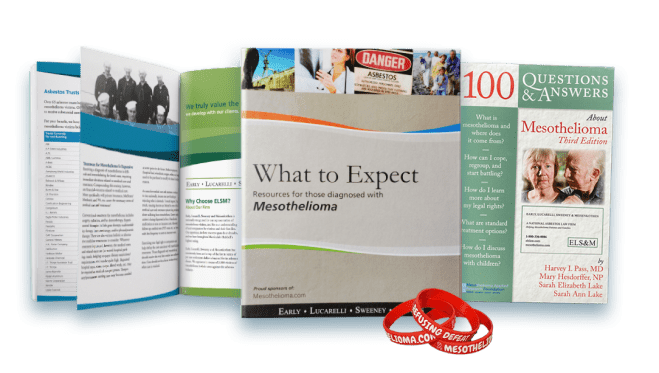Table of Contents
Home → Mesothelioma → Stages
Mesothelioma Stages
Doctors classify mesothelioma into four main stages. During mesothelioma diagnosis, doctors determine whether the cancer is stage 1, 2, 3 or 4. Stage 1 is the earliest stage, and stage 4 is the most advanced stage of malignant mesothelioma.
Key Facts
- Mesothelioma has four stages.
- Staging does not change as the disease progresses or if tumors grow or shrink.
- Pleural mesothelioma is the only type of mesothelioma with a specific staging system, as it is the most common type of the cancer.
- Patients with later stage mesothelioma typically experience more noticeable symptoms and worse life expectancies.
What Are the Four Stages of Mesothelioma?
Most cancers, including mesothelioma, are categorized into four stages. Staging primarily focuses on whether cancer has spread from the original tumor site, and how far it has spread. The four stages of mesothelioma are:
Stage 1: The tumor is localized to the lining it developed in and has not spread.
Stage 2: Cancer has spread to nearby organs, such as the lungs.
Stage 3: Cancer cells have spread to nearby tissues, lymph nodes and/or organs.
Stage 4: Cancer has spread to both nearby and distant organs, tissues and lymph nodes.
At diagnosis, most patients have stage 3 or 4 mesothelioma. This is often because symptoms may be absent or mild in earlier stages, making it harder for patients to realize something is wrong. The stage of a patient’s cancer can be an important factor in developing a treatment plan.
Stage 1 Mesothelioma
Stage 1 mesothelioma is the earliest stage of mesothelioma. Symptoms that develop are typically mild. In stage 1, the cancer has not spread beyond the initial tumor. Stage 1 mesothelioma often responds well to treatment, and a variety of different therapies may be available.
Stage 2 Mesothelioma
In stage 2 mesothelioma, the cancer has spread to nearby tissues. However, the spread is still localized. Symptoms may be mild and patients often have many treatment options available. These may include surgery, immunotherapy and chemotherapy.
Stage 3 Mesothelioma
Stage 3 is an advanced or later stage of mesothelioma cancer. At this stage, cancer has spread to nearby organs, tissues and lymph nodes. In pleural mesothelioma, this may include the lungs and chest wall. Treatment options are available to alleviate symptoms and potentially extend survival.
Stage 4 Mesothelioma
Stage 4 mesothelioma is the most advanced stage. In this stage, the cancer has spread to distant tissues or body parts. In pleural mesothelioma, this may include the liver, bones, neck and other areas. Some treatments, like surgery and immunotherapy, have improved some patients’ survival.
Palliative care can also help patients manage symptoms and treatment side effects, and improve overall comfort and quality of life.
How Is Mesothelioma Stage Determined?
Staging refers to the process of categorizing cancer depending on how much cancer is in the patient’s body. A mesothelioma doctor will usually complete staging during a patient’s initial diagnosis, based on set characteristics of each stage.
Pleural mesothelioma is the only type of mesothelioma with its own unique staging system. This system is known as the Tumor, Nodes and Metastasis or TNM staging system. It classifies stage based on tumor size and location, if cancer has spread to lymph nodes and the extent of spreading.
Since other types of malignant mesothelioma do not have their own staging systems, oncologists may use general cancer staging or modified TNM staging.
Why Does Mesothelioma Stage Matter?
Staging mesothelioma cancer is an important factor in developing a treatment plan for an individual patient. Typically, patients with stage 1 or 2 mesothelioma have more treatment options and better survival rates than those diagnosed in stage 3 or 4. Some treatments may be available for earlier stages, but considered too aggressive or risky for later stages. Treatment options for patients with later-stage mesothelioma may be more focused on palliative care, or improving the quality of everyday life.
